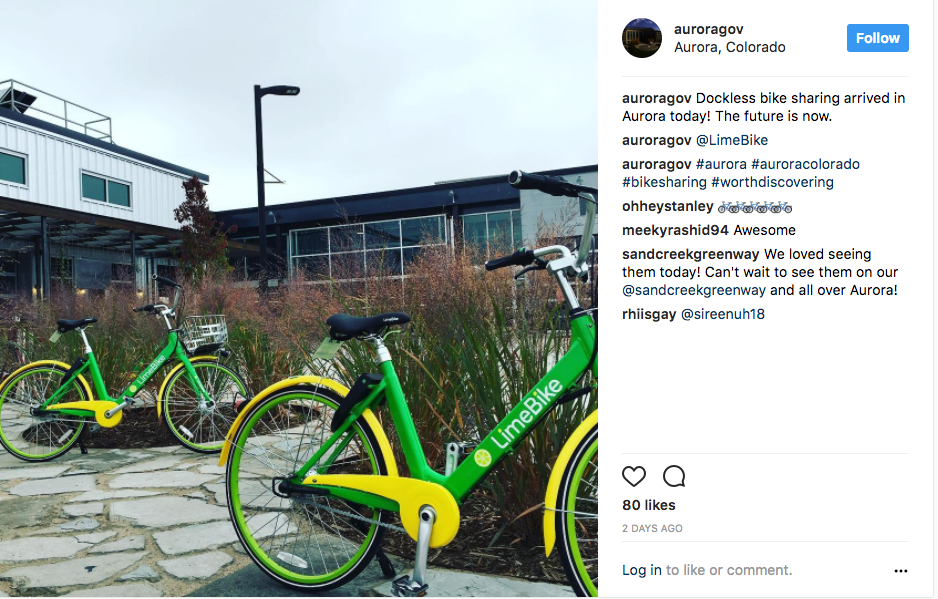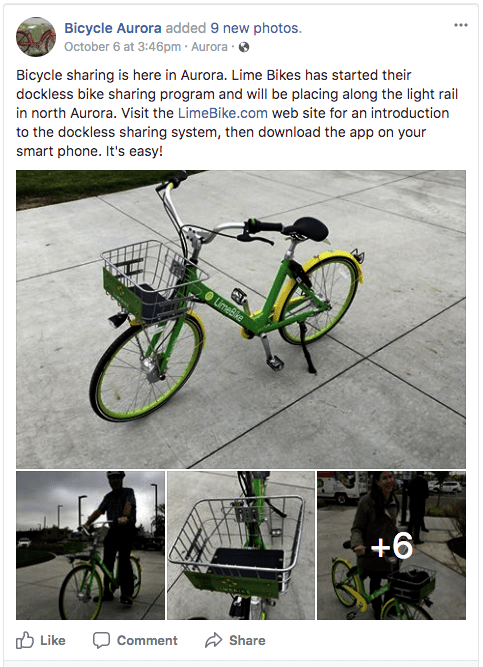Dockless bike sharing could revolutionize transportation in Aurora. Or it could seriously clutter our city. What do you think?
In an effort to increase transportation options for its residents, the city of Aurora introduced a bike sharing permit program on October 2. Just two days later, it awarded its first permit -- to dockless bike sharing company LimeBike. Now lime-green dockless bicycles are scattered throughout the city after a launching event at Stanley Marketplace on Friday, October 6. For the uninitiated (myself included), here's how dockless bike sharing works:
For the uninitiated (myself included), here's how dockless bike sharing works:
- First, you download the LimeBike app onto your Android or iPhone and load credit card information onto your account ($1 per ride, or $29.95/month for 100 rides).
- Using the map in the app, you can see where bikes are currently parked near you. The bikes cannot be reserved and are "first come first serve," so you'll have to hustle to the location of the nearest bike.
- You'll unlock the bike by scanning its barcode with your app. You can ride the bike wherever you need to within the city of Aurora.
- When you get to your destination, park the bike in any place specifically designated for bicycle parking (a bike rack, etc.), and lock the back wheel. Locking the wheel ends your LimeBike session and makes the bike available for another user.
The major difference between regular bike sharing companies and dockless bike sharing companies is the absence of an official docking station. With LimeBike, users can leave the bike at their destinations, as opposed to being limited by the dock locations. That increases the convenience of bike sharing, immensely.
As a permitted operator, LimeBike employs a team to conduct maintenance on the bikes as needed and monitor where bikes have been parked (and for how long).
[gallery columns="2" size="medium" ids="24966,24915"]
So here are our questions:
- What happens if you use a LimeBike to get to your destination, but when you're ready to leave, the bike is gone, having been claimed by someone else? And what if there's no other bike within a walkable distance? It seems that you would need to have a feasible Plan B.
- What about bike helmets? Helmets are not provided with the bike-sharing bikes. Though the state of Colorado does not require bicyclists to wear helmets, it's pretty common knowledge that wearing a helmet is a smart idea and increases safety for the rider. I can't imagine that residents will take to carrying around helmets just in case they are able to snag a bike share.
- What about city limits? What happens if someone uses a bike to travel into another adjoining city? Since Aurora is the one authorizing the bike-share, it will be interesting to see how this plays out for nearby cities like Centennial or Denver.
- Dockless bike sharing works on the honor system. It relies on rule-following citizens to park the bikes upright and in designated bike parking areas. I'm imagining that in a few months, we'll be coming across abandoned, banged-up bikes in the middle of parking lots or roads, or lying on someone's front lawn. Is our population trustworthy enough to make this bike sharing initiative a success?[gallery columns="2" size="medium" ids="24967,24968"]
bikes clog sidewalks and pile up in unruly flocks outside subway stations, shopping malls, office buildings and road intersections," The Washington Post reported. "Unwanted or broken bikes are dumped by highways, in rivers and parks, on construction sites, or under bridges. Shanghai-based blogger Marc Milián calls them a 'plague,' while locals have taken to social media to lambaste the 'anarchic experiment' that is creating 'a new generation of trash.'"Two GeekWire reporters in Seattle tested the new bike share system over the summer, reporting that the apps sometimes erroneously showed a bike's presence at a location, only for the user to show up and find no bike. That could be a potential problem for riders who rely solely on bike sharing for mobility.
 But Aurora is committed to trying it.
But Aurora is committed to trying it.
An Aurora City Council goal is to reduce travel time and congestion and provide multi-modal mobility choices," the city's press release said. "Operators will be required to report regularly on statistics related to their fleet and membership, and provide the city with a record of maintenance activities. The city will periodically evaluate the safety, efficiency, and compliance of the bicycle-share permit program over time."So what do you think? What benefits do you see the program having for Aurora? What potential concerns do you see? Have you seen dockless bike sharing work successfully? We want to hear your thoughts in the comments below!
